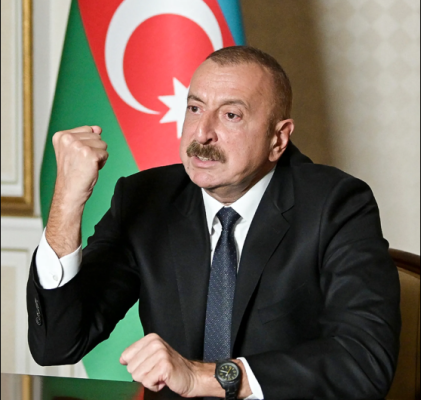Ilham Aliyev is the President of Azerbaijan, having held office since October 31, 2003. He is the son of Heydar Aliyev, the former President of Azerbaijan and a prominent political figure in the country. Ilham Aliyev's presidency has been marked by his consolidation of power, economic growth driven by oil and gas resources, and a continued emphasis on the strategic importance of Azerbaijan within the Caucasus region and the wider international community.
Early Life and Education:
Ilham Aliyev was born on December 24, 1961, in Baku, the capital of Azerbaijan. He is the son of Heydar Aliyev, a key figure in Soviet-era Azerbaijan who later became the country’s president after independence in 1991. Growing up in a politically prominent family, Aliyev received an elite education. He graduated from the Kiev State University in Ukraine, where he earned a degree in International Relations. Later, he continued his studies at the Harvard University Kennedy School of Government in the United States, further shaping his leadership style and political outlook.
Early Career:
Before entering politics, Ilham Aliyev had a successful career in various fields, including sports, business, and diplomacy. He was a skilled sportsman and was known for his accomplishments in judo and sambo wrestling. In the early 1990s, he worked in the State Oil Company of Azerbaijan (SOCAR), which gave him a deep understanding of Azerbaijan’s vital energy sector, which plays a central role in the country's economy.
In the mid-1990s, Ilham Aliyev began to establish himself in the political scene as he joined the ruling New Azerbaijan Party (YAP), founded by his father, Heydar Aliyev. His political career was accelerated when he was appointed as Vice President of SOCAR and as the country’s Prime Minister.
Presidency:
Ilham Aliyev became President of Azerbaijan after his father’s death in 2003. Heydar Aliyev had handpicked Ilham as his successor, and following his father’s passing, Ilham won the presidency in a controversial election. He was reelected in 2008, 2013, and 2018, with his rule marked by a strong grip on political power, though his elections have faced criticism for alleged irregularities and lack of political competition.
Domestic Policies:
Ilham Aliyev's presidency has focused on economic modernization, national development, and the promotion of Azerbaijan’s energy wealth. The country’s oil and gas reserves have been central to his administration’s economic policies. Azerbaijan has become a significant player in the energy market, benefiting from the Baku-Tbilisi-Ceyhan pipeline and other infrastructure projects that export oil and gas to Europe and the global market.
In addition to economic reforms, Aliyev has prioritized the construction of infrastructure, including highways, airports, and sports facilities, and has worked to attract foreign investment in Azerbaijan. His government has emphasized the development of sectors like tourism, construction, and high technology.
While his leadership has led to economic growth and increased living standards for many Azerbaijanis, critics argue that Aliyev’s regime has been marked by authoritarian practices, with restrictions on freedom of speech, political opposition, and press freedom. The government has been accused of repressing dissent, imprisoning political opponents, and curbing the activities of civil society organizations.
Foreign Policy:
Ilham Aliyev’s foreign policy has been shaped by Azerbaijan's strategic position in the Caucasus region and its role as a key energy supplier to the West. His administration has pursued a balanced foreign policy, working to maintain strong relations with countries like Turkey, Russia, and the United States, while also focusing on regional stability.
One of the key challenges to his presidency has been the Nagorno-Karabakh conflict, a long-standing territorial dispute with neighboring Armenia. The region, populated mainly by ethnic Armenians, declared independence from Azerbaijan in the early 1990s, leading to a war that left thousands dead and displaced many more. Though a ceasefire was signed in 1994, the conflict remained unresolved.
In September 2020, tensions over Nagorno-Karabakh erupted into a six-week war between Azerbaijan and Armenia, with Azerbaijan gaining control over significant parts of the disputed region. The war ended with a ceasefire brokered by Russia, which allowed Azerbaijan to reclaim territory lost in the 1990s. This victory significantly boosted Ilham Aliyev’s popularity and cemented his leadership at home, while also strengthening his regional position. The 2020 Nagorno-Karabakh war and the subsequent peace deal have significantly impacted Azerbaijan's geopolitical role, positioning it as a more influential power in the South Caucasus.
Economic and Energy Strategy:
Azerbaijan's economy is highly dependent on its oil and gas resources, which have been central to the country’s economic growth under Ilham Aliyev. The government has worked to diversify the economy and reduce its dependence on energy exports by investing in infrastructure, tourism, and agriculture.
Azerbaijan’s energy policy has also led to greater engagement with the European Union and NATO, with the country playing a significant role in energy transit between Central Asia and Europe, through the Southern Gas Corridor project. The Baku-Tbilisi-Ceyhan pipeline and the Trans-Anatolian Natural Gas Pipeline (TANAP) are vital components of this strategy.
Human Rights and Political Opposition:
Ilham Aliyev’s rule has faced significant criticism from international human rights organizations for crackdowns on political opposition, freedom of expression, and media freedom. Reports of political repression and the imprisonment of activists and journalists have been common throughout his presidency. The government has also been accused of limiting political pluralism and maintaining a cult of personality around the Aliyev family.
Despite these criticisms, Aliyev's administration has remained relatively stable, in part due to the wealth generated by Azerbaijan’s energy resources and the support of key international partners, particularly Turkey and Russia.
Personal Life:
Ilham Aliyev is married to Mehriban Aliyeva, who is the First Vice President of Azerbaijan. She is a prominent figure in her own right, serving as the head of several cultural and charitable organizations. The Aliyev family has played a dominant role in Azerbaijani politics for several decades, with Ilham and Mehriban’s children also involved in various governmental and business activities.


